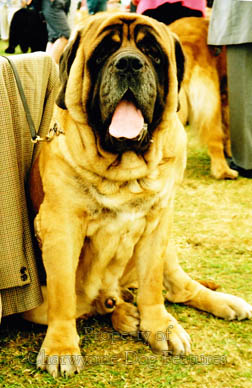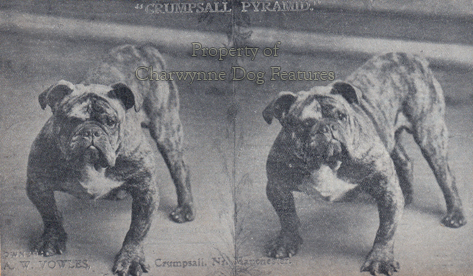537 Ethical Treatment of Dogs
ETHICALLY TREATING DOGS
by David Hancock

 The domestic dog is very much a subject creature, especially vulnerable to man's whim. Some breeds are particular victims of man's whim and sadly many of them are British. I feel sad when I see the anatomy we have knowingly, and with selfish human intent, inflicted on the show editions of the Basset Hound, the Dachshund, the Mastiff and the Bulldog. I despair when I see Clumber Spaniels at Crufts with red-raw eyes, a distressing common feature of the show specimens which could so easily be bred out. It is depressing to hear of champion Bulldogs dying at four years of age when vigour could so quickly be bred in.
The domestic dog is very much a subject creature, especially vulnerable to man's whim. Some breeds are particular victims of man's whim and sadly many of them are British. I feel sad when I see the anatomy we have knowingly, and with selfish human intent, inflicted on the show editions of the Basset Hound, the Dachshund, the Mastiff and the Bulldog. I despair when I see Clumber Spaniels at Crufts with red-raw eyes, a distressing common feature of the show specimens which could so easily be bred out. It is depressing to hear of champion Bulldogs dying at four years of age when vigour could so quickly be bred in.
Twenty countries have recognised the harm being done to certain breeds and signed a commitment to do something about it. We have not. Our government department concerned, DEFRA, has been ambushed by the Kennel Club, which claims to be able, single-handedly, to rectify this. The Kennel Club is mainly funded by registrations of pedigree dogs; most of the breeds recognised by 20 other countries as needing protection from harmful breeding are British. The European Convention for the Protection of Pet Animals, ETS 125, lists 14 British breeds as having inbred harmful physical features which need to be minimised. Twenty other countries have decided that this matter is too important to be left to kennel clubs; DEFRA has not. 
Regrettably, the ultimate authority in Britain in the world of purebred dogs, the Kennel Club, takes the view that the future of each breed lies with the breed clubs concerned. This is commendably democratic in theory but recklessly irresponsible in practice. The KC, with some justification, expects breed clubs to have the best interests of their breed forever in mind. This is at best naive and at worst an abrogation of responsibility. Of course there are some admirable breed clubs but others so often mirror society, in that position and power are more likely pursuits than selflessness and honour. Feuding between and within breed clubs is a sad feature of the pedigree dog world. People who care more about their personal position than the well-being of their breed are unlikely agents for the protection of anatomically-sounder prototypal form and the pursuit of healthier dogs. 
It is against this background of human selfishness that breeds get harmed and their club officials proceed without a national parent body to question their motives and see through their less creditable activities. In this way, breed features which harm a breed and limit a dog's ability to lead a healthy life become acceptable as permanent, even desirable. At a time when veterinary and genetic advice, supported by authoritative action by the only body able to do so --the Kennel Club, is urgently needed, what do we actually have? Breed clubs being allowed to ignore advice from veterinary scientists and geneticists which would produce healthier dogs; no attempt made to record on computerised registers the faults and flaws of sires and dams to reduce the likelihood of disabled puppies; no steps being taken to breed out harmful breed features such as protruding eyes, overlong backs and oversized heads. In short, moral anarchy. Breeds deserve not public apathy or breeder indifference but sound custodianship. We could do so much more to protect man's best friend. 
The KC argues that rectification can be best achieved by rewording the word picture or breed standard for a number of breeds. But exaggeration only crept in because fanciers ignored the wording of the standard, or changed it, with the connivance of the KC. The degrading changes to the anatomy of the Bull Terrier, the Bulldog, the Mastiff, the Clumber Spaniel and the Pomeranian in the last century came about because the KC permitted it. The original breed standards were altered to suit the breeders not their dogs. Overlooking the regrettable silence from the veterinary profession on this subject, who can put this right? The shameless diversionary cry of 'Fight Interference from Brussels' is a lazy dishonourable response to informed enlightened action by well-intentioned activists in an admirable cause. The mainland European dog-lovers are putting their house in order; why can't we? They are going to alter our exaggerated breeds and we are going to just watch.
Who actually disputes that the Dachshund has become too long in the back, the show Basset Hound too bent-legged, the Bulldog too unathletic, the Mastiff too heavy, the Pekingese too short- faced, the eyes of the show Bloodhound too loose, the eyes of the Brussels Griffon too protruding, the ears of the Cocker Spaniel too long and the Pug too handicapped by markedly folded skin? Can you separate the opposition to such humane thinking from financial vested interest? Breeders of dogs with harmful exaggerations have a lot to lose; those bodies gaining financially from the registration of dogs bearing harmful inbred features face oblivion if their income plummets. Should DEFRA be consulting a private club with such a financial interest in the outcome? Should DEFRA be consulting a private club which is doing so little to combat that other threat to the pedigree dog's future: inherited defects?